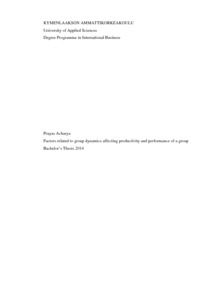Factors related to group dynamics affecting productivity and performance of a group
Acharya, Prayas (2014)
Acharya, Prayas
Kymenlaakson ammattikorkeakoulu
2014
All rights reserved
Julkaisun pysyvä osoite on
https://urn.fi/URN:NBN:fi:amk-2014120919123
https://urn.fi/URN:NBN:fi:amk-2014120919123
Tiivistelmä
The aim of the study is to find out specific group related factors that contribute to the
group’s productivity and performance. The context of the study is Kymenlaakson
ammattikorkeakoulu, University Of Applied Sciences. The main interest in this research
is on students from diverse cultural backgrounds involved in group tasks at the
school. Most of the students were pursuing the degree in International Business program.
The methodology used for the research is Grounded Theory Method. Structured interviews
were used to collect data. The data used are all primary sources of data. Qualitative
analysis software NVivo (version 7) was used for analyzing data which consisted
of transcribed interviews from 22 respondents.
The study shows that individual factors such as experience, culture, personality, motivation,
punctuality and so on determines an individual’s group preference, which furthers
leads to ease and difficulty working in a group. If there is ease in working in
groups, it leads to higher productivity and performance. If there are difficulties then
various conflicts arises. This research shows that depending upon whether the conflict
is constructive or dysfunctional, it has positive and negative effects on the productivity
and performance of the group respectively. Towards the end, the study is evaluated
and further practical and theoretical implications suggested.
group’s productivity and performance. The context of the study is Kymenlaakson
ammattikorkeakoulu, University Of Applied Sciences. The main interest in this research
is on students from diverse cultural backgrounds involved in group tasks at the
school. Most of the students were pursuing the degree in International Business program.
The methodology used for the research is Grounded Theory Method. Structured interviews
were used to collect data. The data used are all primary sources of data. Qualitative
analysis software NVivo (version 7) was used for analyzing data which consisted
of transcribed interviews from 22 respondents.
The study shows that individual factors such as experience, culture, personality, motivation,
punctuality and so on determines an individual’s group preference, which furthers
leads to ease and difficulty working in a group. If there is ease in working in
groups, it leads to higher productivity and performance. If there are difficulties then
various conflicts arises. This research shows that depending upon whether the conflict
is constructive or dysfunctional, it has positive and negative effects on the productivity
and performance of the group respectively. Towards the end, the study is evaluated
and further practical and theoretical implications suggested.
